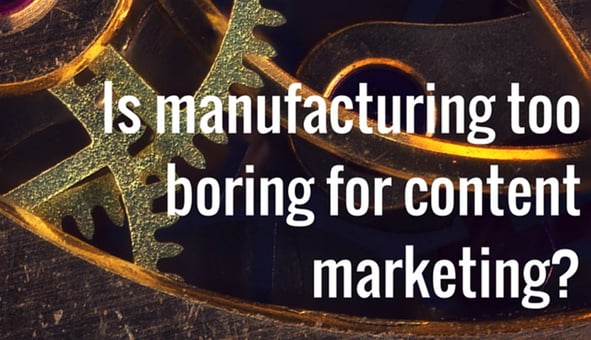
Few businesses in the specialist manufacturing industry take full advantage of content marketing. Because specialist manufacturing is seen as a “boring” business-to-business (B2B) industry that doesn’t capture people’s attention, manufacturers don’t invest in inbound marketing, which relies on enticing content to draw people in.
Manufacturers, however, can take advantage of content marketing. No part of the manufacturing industry is too boring for digital marketing, although the content used must be adapted to suit the industry. If you run a specialised manufacturing company, here’s how you can run a successful content marketing campaign, even if you’re products are “boring.”
Redefine Content Marketing Success
The objection that manufacturing is too boring for content marketing echoes of an age-old dilemma that manufacturers face. Specialised manufacturing isn’t glamorous, so how can it be marketed? The answer to this question is to not try to make manufacturing alluring but to make it relevant.
To rephrase this in content marketing language, manufacturing blogs and videos will never go viral. A piece titled "Hot tapping in service pipelines: 5 key considerations" will never receive as many clicks as “5 Cute Kittens” or “The 5 Best Vacation Beaches.” This is why many consider content marketing in the manufacturing industry a lost cause, because manufacturing-related content doesn’t “succeed,” or go viral.

Manufacturers don’t need their content to go viral, though. Your company doesn’t need the general public to be familiar with your products. You need to reach a select group of businesses who could use the products that your company manufactures. In the specialised manufacturing industry, content marketing success should be redefined to reflect your target audience’s level of interaction with your company’s content. Instead of merely measuring views and shares (which show virality), you might look at:
- time on page
- conversion rates
- brand-name recognition among your target audience
- frequency of mentions on industry-specific forums
- number of links from industry-related websites
Define Buyer Personas
To measure your content marketing’s success among your target audience, you’ll need to develop buyer personas that reflect your target audience. Assuming your company already has customers, these should form the foundation of your buyer personas. For instance, if you sell custom-made metal parts and your largest customer is a small business owner who makes boats, your buyer persona might be “Sailing Sam, owner and craftsman of a custom sailboat maker.”
Ideally, you should have four to six buyer personas, which will provide variety in your content without losing focus.
Address Your Buyer Personas’ Needs
Well-developed buyer personas will include needs that your company meets. These will help identify problems that your company meets, which will increase both your content’s relevancy and usefulness among your target audience. If you can precisely state your target audience’s needs, your content creators will be able to consistently create informative and engaging content that will convert your target audience into trusted customers.
This strategy doesn’t seek to make manufacturing glamorous, because a hard hat’s never going to be on the front of a clothing catalogue. Instead, it seeks to identify your target audience with buyer personas and then identify their needs. With this information, you can help your customers and establish your manufacturing business as an authority in the industry. People won’t come to your company for a light-hearted laugh, but they will come for information they can trust. That’s how content marketing in the manufacturing industry can succeed.
Download our sales and marketing for manufacturing eBook to find out how you use contnet marketing effectively as part of a successful sales and marketing strategy for your manufacturing business:
 By
By